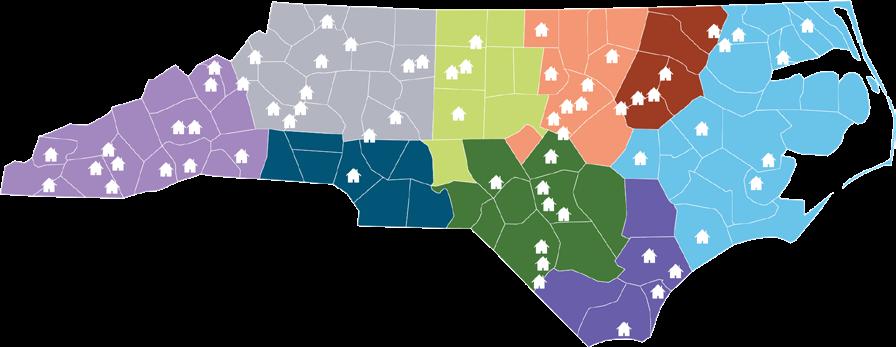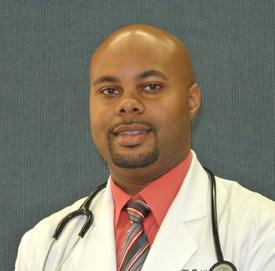
6 minute read
Student & Preceptor Services
Student & Preceptor Services TRAIN
Since the 1970s, our program has provided short-term lodging for health science students who are completing community-based rotations in North Carolina. Our goal is to make communitybased education at clinical sites more accessible.
The NC AHEC Program operates housing in 50 counties and approximately 60 towns and cities across the state. The majority of AHEC housing is provided through apartments and AHEC-owned lodging, but private residences are also utilized, especially in rural areas.
In 2018-19, we provided over 54,000 nights of housing and served 1,564 students. Our services supported 4,956 rotations in all nine AHEC regions.
Each house represents a location where one or more AHEC-supported student rotations occured, illustrating how far-reaching community-based education extends across our state.
For our affilitated academic partners, the current rate is $7 per night. These schools are invoiced twice yearly for their students’ use of housing. Students from all other schools are charged up to $25 per night, and local AHECs collect fees directly from these students.
Our affiliated academic partners:
• Campbell University • Duke University • East Carolina University • UNC-Chapel Hill • UNC-Charlotte • UNC-Greensboro • UNC-Wilmington • Wake Forest University • Western Carolina University • Winston-Salem State University
Any health science student may apply for housing through our online portal at my.ncahec.net. Once an application is received, the student will receive further instructions from a regional AHEC. QUESTIONS?
ALAN BROWN Associate Director of Student Services alan_brown@ncahec.net 919-966-0814
WHAT IS THE CCEP?
The CONSORTIUM FOR CLINICAL EDUCATION AND PRACTICE (CCEP) is a coalition of 96 academic partners, 29 health systems, and over 60 health facilities organized to identify, prioritize, and address clinical placement issues for health science students across all nine AHEC regions. The CCEP meets regularly to address clinical capacity issues, facilitate the placement of students in a given region, and standardize processes related to preceptorship and clinical education. Facilitated by Kathy Clark at WAKE AHEC, the CCEP focuses their efforts on three key areas. 1 Standardize clinical faculty and student credentialing
2The process of credentialing students for clinical placements (including background checks and drug and immunization screenings) can vary by health agency throughout the state. The CCEP successfully standardized this process by raising requirements to the highest level for its health system partners in 2018.
Develop a common orientation for students and faculty
Preparing students and preceptors before beginning a clinical placement helps ensure their success in the field. The CCEP introduced a core orientation for 2019-2020 that includes information on HIPAA, infection control, patient safety, standards of behavior, and cultural diversity. Participants receive a certificate upon completion. Members of the CCEP pose at a conference session exhibiting the coalition’s initiatives and outcomes.

3Streamline the clinical placement process
Schools and sites statewide have different procedures and timelines for requesting and confirming clinical placements. CCEP has researched various online vendors to help standardize dates and deadlines for placements. Duke University Health System and WakeMed Health & Hospitals adopted a system based on this research that was implemented in Fall 2019.
QUESTIONS?
KATHY CLARK CCEP Coordinator kgclark@wakeahec.org 919-350-0481
TRAIN Graduate Medical Education
SAM CYKERT Director of Graduate Medical Education sam_cykert@ncahec.net 919-843-4832
8 |10 | Residency teaching programs are central to the reason why the NC AHEC Program was established—to create an infrastructure to expand the number, diversity, and training of primary care physicians statewide.
Today, we support 19 community residency programs in family medicine, general surgery, psychiatry, internal medicine, pediatrics, and obstetrics and gynecology across all nine AHEC regions.
DID YOU KNOW?
Medical residencies can last three to seven years, depending on a physician’s chosen specialty. An NC AHEC residency is just the right size—large enough to feel like part of a team, but small enough to receive tailored one-on-one training. Appointed faculty continuously improve their training methods, including those at GREENSBORO AHEC, which expanded its faculty development offerings in 2019 to include interprofessional education, mindsets and well-being, and more.
Clinical rotations offer diverse learning experiences by facilitating opportunities to work with community preceptors, regional health departments, outreach clinics, and other community partnerships. In 2018, residents at SEAHEC participated in the inaugural Wilmington MedFest for Special Olympic athletes and provided physicals to over 100 special needs athletes from all five counties in the region.
Whether in a university or hospital-based program, NC AHEC residencies support continuity of practice by providing care to the same patients over the length of a program, especially in vulnerable populations. Residents and faculty at CHARLOTTE AHEC, for example, made over 55,000 outpatient visits to Medicaid, Medicare, and uninsured patients in 2018-19.
Teaching faculty design responsive curriculums that encourage residents to explore their interests in specialties while developing a firm foundation to provide excellent patient care, no matter the circumstances. To prepare its residents for different scenarios, MAHEC opened its Simulation Center in July 2018 to create hands-on experiences in providing care in health emergencies.
Learning to integrate the latest innovative technology is at the forefront of every AHEC resident’s experience. In 2019, SEAHEC hosted a program for NC AHEC residents on point-of-care ultrasound techniques that can lend clinicians a diagnostic edge and produce better medical outcomes.
DR. STERLING RIDDLEY is a 2019 graduate of the Southern Regional AHEC Family Medicine residency program in Fayetteville.
MEET AN AHEC RESIDENT

When considering where to pursue his residency, Dr. Sterling Riddley was drawn to practice medicine in his adopted hometown of Fayetteville, North Carolina, where he graduated from high school and has family connections. He felt that the reputation of SOUTHERN REGIONAL AHEC and the chance to return to familiar surroundings would help him develop as a well-rounded physician.
“I have always considered Fayetteville my home,” Dr. Riddley shared. “The opportunity to return there to complete my medical training and serve my community was ideal.” After graduating in June 2018, the boardcertified physician was accepted as Southern Regional’s first Diabetes Fellow. Dr. Riddley worked closely with diabetic patients in the Family Medicine Center on an interprofessional team to become an expert diabetologist. One year later, Dr. Riddley is now practicing medicine with the same faculty physicians who served as his mentors. “I learned key lessons during my time as a resident and fellow that taught me to look at the big picture when solving problems and treating patients,” he said.
Having found his niche teaching new residents, Dr. Riddley tells medical students pursuing family medicine that they should consider NC AHEC residencies. “This program prepares physicians for outpatient, inpatient, urgent care or academic work,” he said. “It’s a great place to train where the importance of being
a well-rounded family physician in multiple settings is stressed.”
Speaking of his own personal highlights during his residency, Dr. Riddley believes that the success of Southern Regional’s program is largely due to its supportive and encouraging atmosphere. “The diversity and stability found within this community are the main reasons why I would recommend this program.”
MAKING A DIFFERENCE
In 2017, 53% of physicians who participated in an AHEC residency between since 1997 were still practicing in North Carolina. This retention rate is higher than other non-AHEC residency programs in the state. The Family Medicine Residency program at MAHEC is particularly successful, retaining 74% of its graduates from 2008 to 2011 to support a high concentration of family physicians in Western NC.





